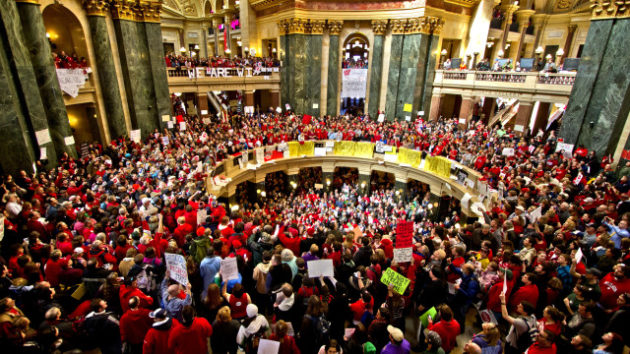The First Amendment Could Break the Grip of Government Unions by Charles W. Baird
On January 11, 2016, the Supreme Court will hear arguments in Friedrichs v. California Teachers Association. It will be one of the Court’s most consequential cases this term. A decision in favor of Rebecca Friedrichs, a California public school teacher, could begin to undo the catastrophic damage caused by the widespread unionization of government employees in the 1960s and 1970s.
Municipal bankruptcies, state insolvencies, decaying public education, political corruption, and attacks on the freedom of speech and freedom of association of government employees are only the most visible wreckage of that disastrous mistake.
The question before the Court is whether forcing government employees to pay dues to a government employee union is a violation of the First Amendment.
In the Abood decision (1977), the Supreme Court sanctioned such coercion. Government workers could be forced to pay for the collective bargaining activities of the unions that represent them, but, the majority held, they could not be forced to pay that portion of dues unions use directly for political advocacy, as that would violate their right to free speech.
In his concurring opinion, Justice Lewis Powell warned the Court that there is no “basis … for distinguishing ‘collective bargaining activities’ from ‘political activities’ so far as the interests protected by the First Amendment are concerned. Collective bargaining in the public sector is ‘political’ in any meaningful sense of the word.”
In Abood, the majority disregarded Powell’s concern. But in Friedrichs, the Court will have to reconsider Powell’s insight that collective bargaining in the government sector is inherently political. The wages, salaries, and other conditions of government employment are political questions: they directly affect voters, taxpayers, and the actions of government agencies. Therefore, no employee should be forced to pay dues or fees for government sector collective bargaining.
If the Court finally agrees with Powell, no union will be able to force any government employee to pay union dues or fees for anything. This will shut down the vicious cycle whereby government unions collect forced tribute from government workers and then use it to help pro-union politicians obtain and maintain political power — who then empower and enrich the government employee unions.
The California Teachers Association (CTA) is panicked by the possibility of losing this case. It’s been showing this PowerPoint presentation throughout the state to try to prod its sympathizers to counterattack. It begs for ideas for “next steps and timelines necessary for CTA to respond to the impact of a negative rulings [sic].”
At the end of the presentation, the CTA finally does what it should have alwayshad to do: It considers how it might do a better job of convincing teachers that union membership is worthwhile. Forced dues and fees make it unnecessary for unions to justify themselves to their captive members.
The unions’ main argument in support of forced dues and fees is the chimerical “free rider” problem. They argue that, under the principle of “exclusive representation,” certified unions must represent all government employees, and if any of those workers did not pay dues and fees, they would receive the benefits of union representation for free. That would be unfair.
But this argument raises a more fundamental question: Why should government unions represent any workers who are not their voluntary members? Without exclusive representation, there could be no free riders. Without free riders, there is no case for compulsory union dues — political or otherwise.
Exclusive representation is not before the Court in this case, but if forced dues and fees in government employment are forbidden, exclusive representation itself may be challenged. After all, forcing anyone to accept the representation of an unwanted union as a condition of government employment seems clearly to violate that worker’s freedom of association. I look forward to such a case.
Charles Baird is a professor of economics emeritus at California State University at East Bay.
He specializes in the law and economics of labor relations, a subject on which he has published several articles in refereed journals and numerous shorter pieces with FEE.




Leave a Reply
Want to join the discussion?Feel free to contribute!